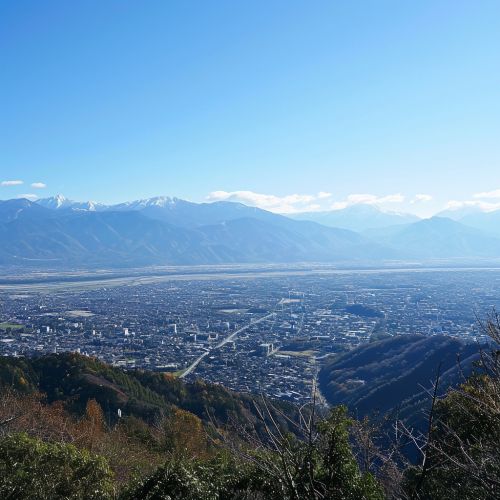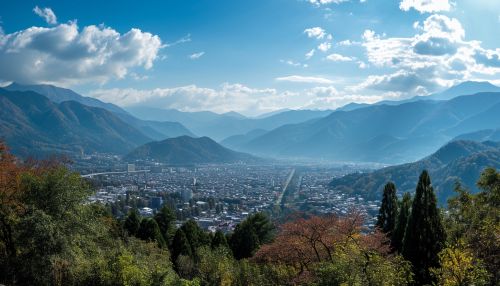Nagano
Geography
Nagano is located in the Chūbu region of Japan, in the central part of the island of Honshū. It is the capital city of Nagano Prefecture, bordered by the prefectures of Niigata to the north, Gunma to the east, Saitama to the southeast, Yamanashi to the south, and Shizuoka, Aichi, Gifu, and Toyama to the west. The city is situated in a basin surrounded by mountains, which are part of the Japanese Alps, and it is known for its beautiful natural scenery and outdoor activities.


History
The history of Nagano dates back to the Jōmon period, with archaeological evidence of settlements in the area. During the Heian period, it became a center of Buddhism in Japan. The city's historical significance is highlighted by the Zenkō-ji Temple, a major pilgrimage site that houses the first Buddhist statue brought to Japan. In the Edo period, Nagano was a prosperous market town and a stop on the Hokkoku Kaidō highway. The city's modern history began with the Meiji Restoration, and it became the capital of Nagano Prefecture in 1871. In recent history, Nagano is best known for hosting the 1998 Winter Olympics, which brought international attention to the city.
Economy
Nagano's economy is diverse, with a mix of agriculture, manufacturing, and services. The city is known for its production of apples, grapes, and other fruits, as well as sake brewing. In terms of manufacturing, Nagano is home to several high-tech industries, including precision machinery and electronics. The city's service sector is also significant, with a focus on tourism, retail, and healthcare. Nagano's economic development has been influenced by its geographical location, historical background, and the impact of the 1998 Winter Olympics.
Culture
Nagano's culture is deeply rooted in its history and natural surroundings. The city is known for its traditional arts and crafts, such as papermaking and pottery, as well as its local cuisine, which features soba noodles, miso, and apple-based dishes. Nagano is also home to several cultural festivals, including the Zenkō-ji Gokaichō, a Buddhist event held every seven years, and the Tomyo Lantern Festival. The city's cultural scene is further enriched by its museums, art galleries, and performing arts venues.
Education
Nagano has a well-developed education system, with a range of institutions from primary schools to universities. The city's higher education institutions include Shinshu University, Nagano University, and several vocational colleges. Nagano also places a strong emphasis on lifelong learning, with numerous community centers and libraries offering educational opportunities for residents of all ages.
Transportation
Nagano is a transportation hub, with excellent road, rail, and air connections. The city is served by the Hokuriku Shinkansen, which provides high-speed rail service to Tokyo and Kanazawa. Nagano's road network includes several expressways, and the city is also accessible by bus. The nearest airport is Matsumoto Airport, located in neighboring Matsumoto City.
Sports
Nagano is known for its sports culture, particularly winter sports. The city's sports facilities, many of which were built for the 1998 Winter Olympics, include the M-Wave speed skating arena and the Hakuba Ski Jumping Stadium. Nagano is also home to professional sports teams, including the Shinano Grandserows baseball team and the AC Nagano Parceiro football team.
